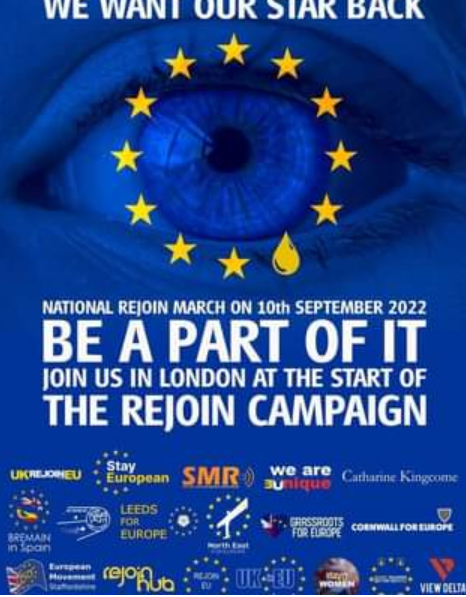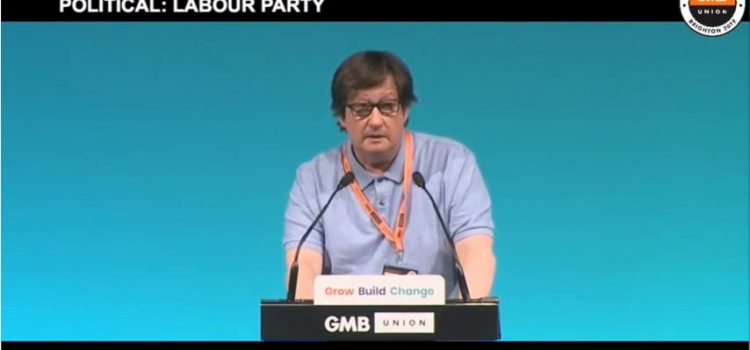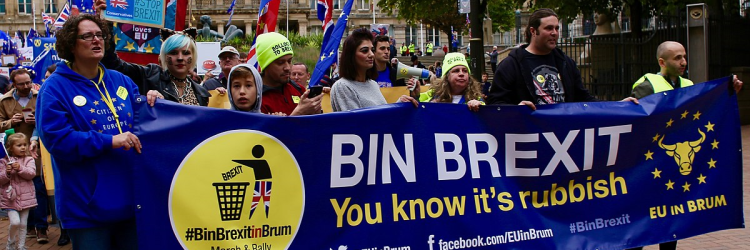I think I’ll be going on this.

I think I’ll be going on this.


I am provoked by Chris Grey’s article, “Making Brexit Boring”; it’s long and covers a number of dimensions of the consequences of Starmer’s speech on Labour’s new approach to the EU. Much of his Brexit blog I agree with and find informative, but I have a couple of things to say on this article.
He writes,
Yet that answer [i.e. Labour’s differences with the Government] is a disappointing one, and in some key respects an ambiguous one. It could hardly have given less to erstwhile remainers without being indistinguishable from the government’s policy. It offered the bare minimum of an alternative, and no one could call it an inspiring vision for Britain’s future. But it wasn’t altogether empty, and its critics should be careful not to fall into the age-old political trap of ‘making the perfect the enemy of the good’.
Chris Grey – Brexit & Beyond
This I feel summarises what Grey thinks of Labour’s position but I hope I don’t fall into the trap he identifies. He also disagrees with those who describe Starmer’s position as cakeism,
It’s also misguided to suggest, as some claimed following the speech, that Starmer’s proposals are ‘cakeist’ (i.e. calling for the benefits of EU membership without belonging).
Chris Grey – Brexit & Beyond
I had not realised that Peston had described the trade barrier proposals as cakeism and I comment on his article below. I believe that arguing for enhanced business visas, mutual recognition of professional qualifications while rejecting free movement of presumably unqualified labour is ‘cakeist’ , unlikely to be agreed by the EU and fails to recognise the UK economy’s labour shortage crisis. It’s pandering to the racism inherent in the objection to free movement and the only way to put this right is to agree to the EU’s freedom of labour and reverse the hostile environment. Many of those who’ve left the UK have done so because they feel unwelcome due to the racism enabled and encouraged by the referendum result.
While Grey welcomes Starmer’s embrace of a Security deal, both he and Stramer fail to recognise that this will entail agreeing to CJEU supervision/jurisdiction of wide areas of our administration of justice. While I have no problem with this, if he is prepared to have the CJEU rule on civil liberties, what’s the problem with having them adjudicate trade issues. Starmer’s line on security co-operation is thus also arguably ‘cakeist’, although the number of people on top of this seems very limited. Although yesterday, the government published its plans for the Data Reform Bill which ORG describes as gutting the GDPR and if so may jeopardise the UK’s ‘adequacy agreement which was another point in Starmer’s plan to retain regulatory alignment with he EU on data and financial services.
Peston in his article also accuses Starmer of cakeism, albeit before I did. His article focuses on the trade aspects of Starmer’s five point plan, I take the alleviation of trade friction as a given in any policy, although I am less sanguine that easing trade friction between NI and Great Britain will have any benefit in calming the political friction in Northern Ireland and Starmer’s plan focuses on that specific trade flow and not cross-channel trade.
Peston avoids looking at how Labour’s remainers/rejoiners will react to the brutal policy outlined by Starmer and Lammy. As I note elsewhere, the tide is flowing against them. …

A development of “Sensibleness Postponed“, and possibly other articles on this blog with stronger economics and better evidenced polling data was posted to Brexitspotlight yesterday. Brexitspotlight is published by Another Europe/AEIP. …

I have been published on Brexit Spotlight. The article reviews the macro economic reporting and increasingly obvious failure of Brexit, it critiques the Labour Party leadership’s recent response reported at least by me in these two blog articles, Sensibleness Postponed, and my take on Lammy’s speech a week earlier , looks at other political forces within and outside the Labour Party. It highlights the Redfield Wilton opinion polling showing growing support for the single market and rejoining the EU and ends with a warning, that Labour “is terrified of setting out a principled case that seeks to lead, not follow, the electorate. Ironically, he i.e. Starmer risks losing Labour voters – especially young and working-age voters – with this strategy”. …

I was tidying up my hard disk and came across the notes of a speech I gave GB 2019. I reported the speech on this blog but while many are saying that time moves on and things of changed, I feel the speech is prescient in its prediction of the failures of Brexit and the collective failure of much of the Trade Union movement to represent its membership. I wanted to say that the pusillanimous position of the CEC should be rejected as you can see in the speech. The 2019 European Parliament elections had just taken place showing the compromisers that the nation wasn’t willing to do that. It was make your mind up time. The Union leaderships allowed themselves to be captured by the Party. Anyway, this is what I planned to say, as they say on press releases, check on delivery.
President, Congress, Dave Levy, London Central General Branch, London Region, 1st time delegate, speaking in support of the CEC Special Report on Brexit
Brexit is poisoning politics and stopping us from addressing the issues that matter to people. It stops us talking about how a radical manifesto can heal the country from the ravages of both Thatcherite and 21st Century Tory austerity.
Not only do Labour’s promises of investment in infrastructure and education offer hope, the answer to low wages is labour marker reform, stronger minimum wage legislation, and to empower the Trade Unions and regulate management. It is not to blame migrants and to extend the hostile environment to another 3m citizens, our neighbours & fellow members and continue the Tory’s voter suppression, excluding them from votes to which they are entitled.
It has been clear since June 2016 and the failure of Leave.EU to articulate an exit model that there was always going to need to be a final say referendum. At the time, or shortly after I argued that the negotiations should be done by those that believe in it. That’s what happened but now we should be asked, all of us, those who voted leave, those who voted remain, those too young to vote last time, citizens abroad denied their vote and EU citizens resident in the UK, asked with humility if that is what is still wanted.
Constructive ambiguity is no longer an attractive position. It loses both remain and leave votes. This is proven to all except the most blinkered by last month’s EU Parliamentary results, the worrying subsequent polls and for those of us that have been out there, personal experience.
Labour lost nearly 60% of its vote, mainly to explicitly remain parties. In my home in Lewisham, despite the Council’s position of strongly supporting a 2nd referendum, the Mayor would be a LibDem. The inconvenient truth is that loosely aligned Remainers leant us their vote in 2017. We should also remember that most of labour’s members and presumably ours and voters want to remain.
While I can respect the voters who voted leave, the result is so criminally flawed that courts would have ordered a rerun if it had been deliberative. i.e. not consultative.
The CEC paper does not go far enough and while stating we oppose a no deal Brexit is welcome, that’s where we were in 2016 and yet we are now in an extension period and running out of time to get a satisfactory deal.
Imagine a worse case situation in the spring, a chaotic Brexit has led to queues on the M20, factory layoffs, food & medicine shortages and high inflation after a currency collapse. We will be telling people that all this is very terrible and should be fought, but, oops… if we actually facilitated Brexit, we won’t be heard. It won’t wash.
It maybe time to make up our mind if we want to alienate the majority or minority of our voters.
Labour’s Conference has been clear since 2016, on the basis of GMB motions that its position is to oppose leaving on inadequate Tory terms and now is the time to say that the Tory’s terms fail to meet our needs. Both May’s deal and No-Deal fails to meet Conference 16 policy; it fails to meet the six tests and fails to meet Conference 18’s thresholds. There’s no protection for jobs, employment rights, environmental protection or consumer rights. And no deal means the reimposition of a border in Ireland.
It’s time! We need a public vote and Labour should declare for Remain. There’s no other option on the table. I’d also urge delegates to look with favour on M xxx. . It’s not a London Region motion so we will listen to the debate before deciding which way to vote.
The picture is not of that speech, may equally not be the correct conference. …

Phil Burton Cartledge analyses the political platforms and accountabilities of the Tory wanabee leaders and their fetish with reducing tax by which they mean corporation tax. The FT reports on business’s response to the proposal, which is lukewarm. They point out that only businesses that make a profit pay corporation tax and that for a business of any complexity[1] and with decent accountants, corporation tax is voluntary. The FT article calls for broader support including demand stimulation albeit through tax cuts, but importantly they raise the issue of VAT on energy (but they pay that too) and also investment incentives. VAT at 20% is ridiculous and the Govt. should reduce it; it can now we are out of the EU.
Phil talks about the conflicts in Johnson’s electoral coalition and the victory of the rentier capitalists in gutting any meaningful levelling up programmes, which have been reduced to crude electoral bribes. This is a long-term trend. We used to call it Regional Policy and I looked at New Labour’s failure to put this right; they were driven by unproven meso-economic theories and then polluted the programme with concerns about welfare to work and regional assemblies.
I should add that another cause of the failure of a levelling up programme is the loss of EU funds. While business is arguing for re-joining the R&D fund, Horizon Europe[2], some local authorities are now lamenting the losses of the European Regional Development Fund & European Social Fund. This was worth about €4bn[3] p.a. to the UK. The UK Government has never it seems been particularly good at getting EU money for business and people and yet the UK has many of the poorest areas Northern Europe.
It’s another necessary dimension of the ‘closest possible’ relationship. The regional programmes were first launched on the UK’s accession to the EU as a means of reducing the UK’s net contribution to the EU. It seems we’re missing them now.
[1] This does exclude most patron personal services companies so perhaps the policy is designed for them.
[2] Horizon Europe has rules that create an enhanced ‘multiplier’ effect.
[3] This includes UK Gov matching funds.
Image Credit: Ilovetheeu, CC BY-SA 4.0 https://creativecommons.org/licenses/by-sa/4.0, via Wikimedia Commons …
I wanted to write about something else, but I can't. Boris Johnson comma, Prime Minister full stop , has resigned or has he? It seems he has agreed to go and they are now as ever haggling about if he can hang on to September as a caretaker while the Tories elect a successor. It's been an exciting 48 hours, started by Savid Javid and Rishi Sunak resigning in both gentie and savage terms. They have been followed by over half the government and counting.
The rest of the article comments on Johnson's amazing performance at the Parliamentary Liaison Ctte where he admits to meeting Lebvedev, his decision to resign but act as caretaker pursuing the same delaying tactics in the hope people be they voters or commentators will get bored. There is a quote from the New European, and from Michael Heseltine. The article finishes with a look at Prof Mark Elliot's, the UK's top constitutional lawyer, views on the constitution.
For this article, there is more to read overleaf, please use the 'Read More' button ...

Having let David Lammy, and to some extent Rachel Reeves trial a new Brexit line, Kier Starmer is planning a speech with a five point plan, which has been previewed (£) in the FT.
Trade is down the plughole (£), as is inward investment and our GDP is set to flatline for the next 18 months and we have labour shortages which are crippling various industries but most obviously agriculture and inflation is now running at 11%. The economy is not in a good state (£). All of this is caused by Brexit, When studying macroeconomics in the ’70s, we thought these dimensions of the economy were choices and a trade off, and while popular theory has changed, it’s quite an achievement for them all to be wrong and yet another not to want to fix it.

Meanwhile the FT article (£) states,
Starmer will insist that a Labour government would not seek to rejoin the EU’s single market or customs union or reintroduce freedom of movement — let alone seek to reverse the 2016 Leave vote.
I say “why not?”. All three of these measures are obvious and growingly popular solutions to the macroeconomic problems we face today.
The five point plan is important, but leaves glaring holes, does Labour propose to put import checks on products not included in the new agreement, will it try and ease the Labour shortage by allowing workers from Europe to return, why would the EU agree to freedom of movement for the professionally qualified only?. Does any of this help jobs and the environment in the east coast and southern port cities?
Meanwhile, Redfield Wilton report that a majority of voters would vote to rejoin the EU although just as with the original referendum the terms of entry are not clear. Starmer and kitchen cabinet are going to be left behind and are in danger of driving their own core votes into the hands of other parties. RW show that the majority of working age people (at least those under 55) support rejoining.
Image: the port is from unsplash, the plughole is public domain …

Two days ago, David Lammy, Labour’s Spokesperson on Foreign Affairs made a speech (mirrored) to a seminar hosted by “UK in a changing Europe”, in which he makes a searing attack on Johnson’s Govt, highlighting the myopia of the defence white papers, and the sectarianism of their approach towards Northern Ireland, and towards the EU. He concludes by stating that Brexit is over, we’re out but that a Labour Government will seek to improve the terms of the Trade & Co-operation agreement, albeit without renegotiating the deal, and without rejoining either the customs union or the single market.
Overleaf, the article includes my statement that Brexit is not over, it also talks of Labour's five points and its inherent 'cakeism' on freedom of movement, it notes the cowardice still within the Labour Front bench and it also looks at the security implications of Brexit, I conclude, 'It looks as if the right of the Labour Party have not read this and are still playing triangulation within the Overton window. There is an uber-Remainer vote to win, it’s young, it works and is often not white. The policy goals are insufficient and they are chasing the wrong votes.' I link to a video of the speech. ...

Has the single market pendulum swung? Tobias Ellwood MP, a Tory, lifted the lid? The GMB voted to recognise that we could do better than the terms agreed; it seems I was preceded (or maybe not) by Ann McMorrin MP, who was rebuked by a courageous un-named Labour spokesperson. McMorrin was followed today, by an article from Stella Creasy, arguing that Labour’s silence on the crapness of the Brexit deal leaves the whole of the narrative to the Tories, although crapness is not the word used by Creasy. This is compounded in my mind by Starmer’s decision to vote for the withdrawal deal! The Creasy article is to my mind very good, and here are two quotes,
For fear of saying the wrong thing, many in Labour claim it is better to say nothing at all about Brexit. But such reticence does not honour those who voted Leave – or Remain. Each wanted their vote to mean something better than chaos at the borders or businesses in peril. Post-Brexit, there are many ways forward for the UK and the EU – and most don’t end in a trade war as a distraction from a prime minister’s personal misconduct
…
Aneurin Bevan once argued that “silent pain evokes no response”. The same is true of silent politics. It will damage our national interest for generations if hostility about the UK working with the EU seeps into public life without dissent. To be able to do business with the biggest trading block in the world, stand shoulder to shoulder against Russian aggression and tackle climate change, terrorism and social injustice, Britain needs us to speak up now. Keeping stumm is not in anyone’s interest except Johnson’s.
Stella creasy – The Observer 19 June 2022
She’s right, we need to talk about the post Brexit deal and the single market; and if the Chair of the Labour Movement for Europe won’t then there’s little reason to expect others to do so as the treatment of McMorrin shows. …